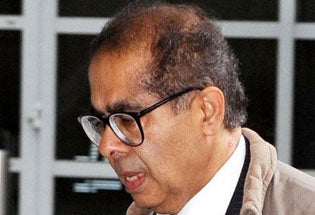'No evidence' push caused G20 death

The stress caused by Ian Tomlinson being shoved to the ground by a policeman during the G20 protests could have triggered a heart attack, an inquest heard today.
Pathologist Dr Freddy Patel said there was a "compelling association" between the two things and it was "well recognised" that a stressful trauma can aggravate a heart condition.
But he told the inquest he found no physical evidence that this was what caused the newspaper seller's death, which he attributed to natural causes.
Mr Tomlinson, 47, collapsed and died on the fringes of the anti-G20 summit demonstrations in central London on April 1 2009 shortly after being hit with a baton and pushed to the pavement from behind by Metropolitan Police officer Pc Simon Harwood.
Dr Patel, who performed the first post-mortem examination, concluded that he had coronary artery disease and could have died at any time.
He was questioned today by Matthew Ryder QC, barrister for Mr Tomlinson's family, about whether the shock of being shoved to the floor by Pc Harwood could have led to the death.
Mr Ryder suggested that Dr Patel's conclusions were wrong and that the cause of death was in fact internal bleeding, as found by other pathologists.
He asked him: "Are you telling the jury that the trauma caused by the push to the ground and the baton strike, about 150 seconds before Mr Tomlinson collapsed, are you telling the jury that they weren't a significant contribution to any heart attack?"
Dr Patel replied: "No, what I'm saying is that there is a compelling association, but there is no causal evidence. A pathologist cannot say that caused it without the evidence."
He added: "Trauma can induce a stressful situation. If there is a stressful situation, it is well known that can be a significant contribution to a heart attack."
The pathologist distinguished between "physical trauma" and "emotional trauma", which he said could not be measured in a post-mortem examination.
The inquest also heard that Dr Patel revised his post-mortem report after pathologists Dr Nat Cary and Dr Kenneth Shorrock disputed his findings.
He changed the wording of his conclusions to make it clear that 3 litres (5.3 pints) of fluid found in Mr Tomlinson's abdomen were not pure blood.
The coroner, Judge Peter Thornton QC, told the jury at the start of the inquest there was likely to be controversy about Dr Patel's findings on how much blood was contained in the liquid.
The abdominal fluid was thrown away before the other pathologists raised questions about the cause of death, the hearing was told.
Mr Tomlinson, who was an alcoholic, had a blood alcohol level about five times the legal driving limit when he died, the inquest heard.
Dr Patel said this could be one explanation for why he did not complain of pain after his collapse.
"If he had sustained a rib fracture as a result of a fall, you would expect him to either put a hand where the injury is or say, 'I've hurt myself' in that region," he said.
"What is confounding is that he has a very high alcohol level and there is a possibility that might have numbed or dulled his perception of pain."
The inquest jury also heard that Dr Patel, who has practised as a pathologist for nearly 35 years, has twice been sanctioned by the General Medical Council for failings in his post-mortem examinations in other cases.
He was suspended for three months in 2010 and is currently serving a further four-month suspension he received this year, the hearing was told.
The inquest at the International Dispute Resolution Centre in Fleet Street, London, was adjourned until tomorrow, when Dr Patel is expected to conclude his evidence.
Subscribe to Independent Premium to bookmark this article
Want to bookmark your favourite articles and stories to read or reference later? Start your Independent Premium subscription today.
